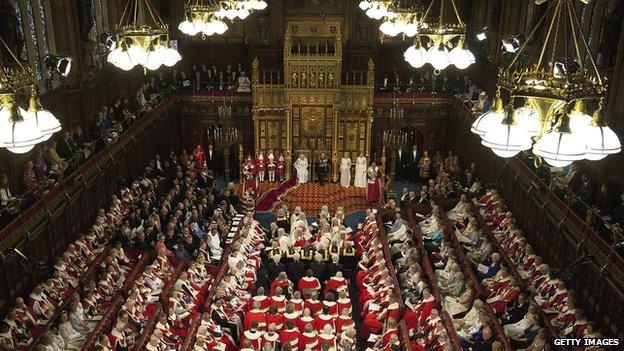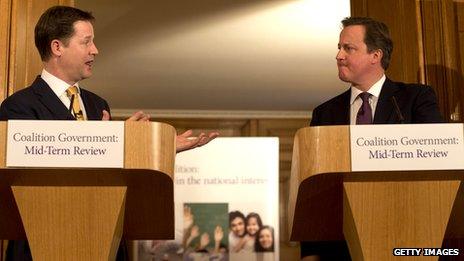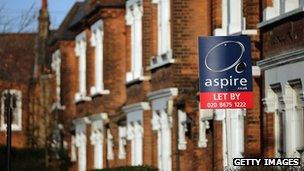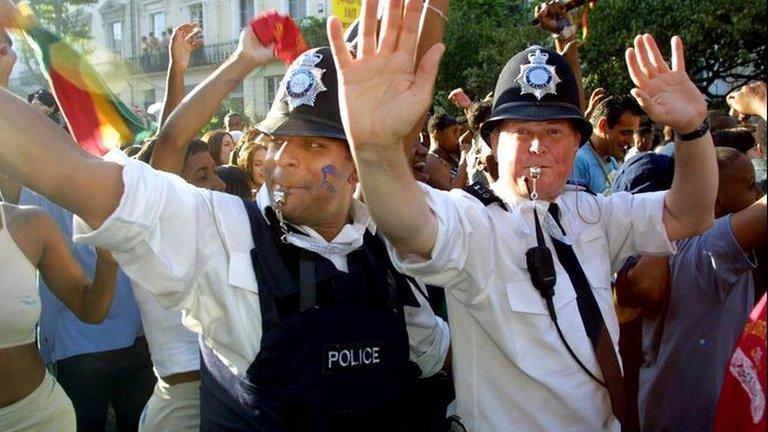The Queen’s Speech: Power and Majesty
- Published

The State Opening of Parliament is a fabulous piece of theatre - a performance dripping with symbolic meaning, repeated over centuries to broadcast an important message about the balance of power between crown, judiciary and lawmakers.
At its heart, though, is a piece of relatively mundane Parliamentary business, the Queen's Speech, setting out the legislative priorities for the forthcoming session.
It is a job that could be conducted with a simple press release, but for governments across the ages, the speech has been a wonderful opportunity to send the electorate a message - one wrapped in ermine, studded with jewels and adorned with ostrich feathers.
The theatre of these speeches can often be as important as the substance, particularly mid-term. The great reforms will usually be in train, and so a speech in the middle of a parliament will tend to be more decorative than architectural in its ambition. It is more about communicating government priorities than constructing a new legislative framework.
For the current government, the staging of this piece of parliamentary theatre is complicated by coalition. The messages risk appearing mixed, the clarity of communication blurred by contradictory interests.

So, for avoidance of doubt, Downing Street put out news release, trying to ensure idiot reporters didn't miss the meaning behind the speech: "The Government will today publish a Queen's Speech that is expected to be all about backing people who work hard and want to get on in life. The Queen's Speech will focus on legislation that unlocks the potential of the people of our country to unleash their talents."
The phrase "people of our country" is a less-than-subtle first hint at how No 10 wants this speech to be read. "We want to attract people who will add to our national life and those who will not should be deterred," the joint message from the prime minister and the deputy prime minister states.
The story of this speech, journalists are being told, is that this government has heard the concerns about immigration and is doing something about it. There's plenty of other stuff in there, of course, but the new Immigration Bill gets star billing in the official release from Downing Street.
The government wants to respond to public concerns about foreigners "who abuse public services" by introducing tough new laws - ministers' best way of saying "we get it". The problem is is that any tightening of controls requires someone to check the immigration status of people and the Treasury doesn't want to spend any extra taxpayers' money on that.
The burden, therefore, is anticipated to fall on others. We are told that, subject to consultation, the Immigration Bill will include provisions to "make landlords of private housing check the immigration status of tenants and face fines if they don't".
It sounds straightforward enough. But for an expanding industry worth billions to the economy, having to check the immigration status of everyone who moves into rented accommodation may well be criticised as a huge amount of extra red-tape. There are roughly four million households in the private rented sector in the UK - 15% of the population - and with no national register of landlords, it will be interesting to see exactly how ministers intend to make this happen.

The bill also promises to "enable tough action against businesses that use illegal labour, including more substantial fines". The law already provides for a fine of up to £10,000 for each illegal worker found to have been employed accidentally, and unlimited fines and imprisonment for "rogue employers knowingly and deliberately using illegal labour", so it is difficult to see how this will make much difference.
Another key component of the Immigration Bill is a proposal designed to "regulate migrant access to the NHS, ensuring that temporary migrants make a contribution". This sounds sensible enough, but introducing systems that distinguish between temporary and permanent migrants, or anyone else for that matter, will not be easy to implement.
We learn today that ministers will be examining whether GPs should be obliged to check passports to assess the nationality of patients - a policing job that many doctors see as contradictory to their caring role.
There will be questions as to whether the cost of employing NHS managers to check the precise immigration status of everyone who uses the health service, distinguishing between temporary and permanent migrants for example, is worth the cost for what is thought to be a tiny fraction of the NHS overall budget.
Government sources said this morning that, at the moment, there are no detailed figures on the cost to the NHS of treating non-UK nationals and they will conduct an audit, but few think it will amount to more than a penny out of every £1,000 the health service spends.
Legal battle
There is one other significant component in the Immigration Bill, as highlighted by No 10: "It will contain provisions to give the full force of legislation to the policy the Government has already adopted in the Immigration Rules to ensure Article 8 (the right the stay in the country because of family connections) is not abused so courts balance the crime committed against the right to remain in the country".
This is a measure responding to public and government anger that foreigners who break the law here can apparently run legal rings round the wishes of Parliament who want such people deported, by citing their right to a family life.
Last February, Home Secretary Theresa May wrote an article for the Mail on Sunday expressing her fury at the way some judges were ignoring changes she had made to the Immigration Rules. The amendment meant, she asserted, that "in the usual case, any foreign national who was convicted of a serious crime should be deported, regardless of whether or not the criminal had a family in the UK".
Mrs May quoted one judge, who had declined to deport a foreign criminal, as having said that "Parliament has not altered the legal duty of the judge determining appeals to decide on proportionality for him or herself".
So it is that the Queen's Speech will include plans for a new law specifically aimed at judges who remain unconvinced, as Mrs May puts it, "that the law is what Parliament says it is, not what they think it should be".
The State Opening of Parliament has always been a reminder to the powerful of how far their writ runs.
- Published24 April 2013
